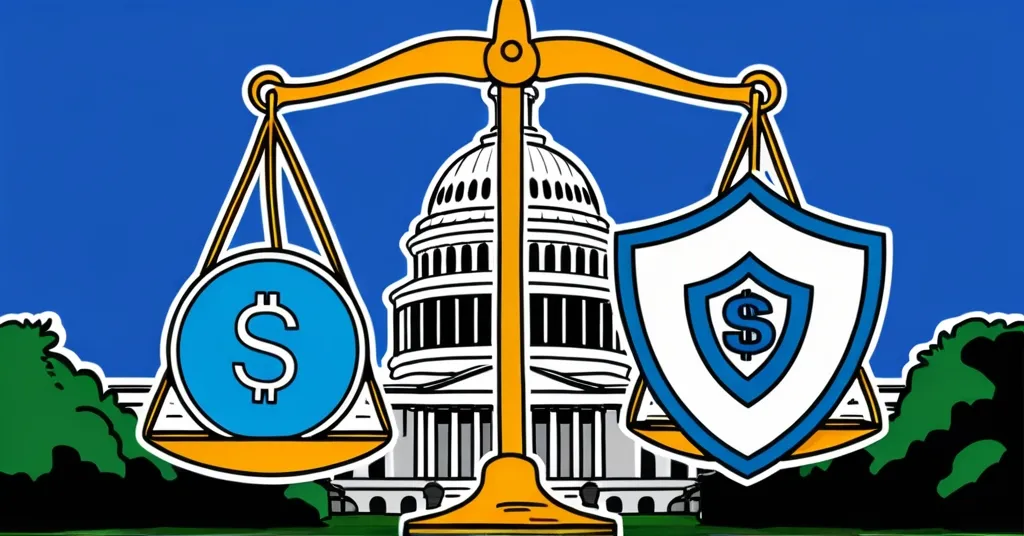Maxine Waters Proposes Bipartisan Bill to Regulate Stablecoins: Aims to Balance Innovation and Consumer Protection

Maxine Waters Unveils Bipartisan Bill to Regulate Stablecoins
Representative Maxine Waters has introduced a draft bill aimed at establishing a regulatory framework for stablecoins in the United States, a move that could significantly shape the future of digital currencies. This bipartisan effort, developed over three years, seeks to balance encouraging new developments with robust consumer protections in the cryptocurrency sector.
- Bipartisan effort developed over three years
- Contrasts with Republican-led STABLE and GENIUS Acts
- Emphasizes Federal Reserve’s role in regulation
- Strong consumer protections and anti-money laundering measures
The crypto world is buzzing with both potential and pitfalls, and Waters’ bill aims to address these dynamics head-on. Crafted through collaboration between Waters and Patrick McHenry during the last Congress, this proposal stands out by assigning the Federal Reserve a central role in regulating stablecoins. This contrasts sharply with the Republican-led STABLE Act, which favors the Office of the Comptroller of the Currency (OCC) as the primary regulatory body.
Stablecoins, cryptocurrencies designed to maintain a stable value, often pegged to a currency like the US dollar, are central to this legislative effort. They serve as a safe store of value within the crypto ecosystem, facilitating efficient trading and providing access to US dollars for those in high inflation countries or without easy banking access. Waters’ bill proposes stringent reserve requirements, ensuring that stablecoins have enough backing to maintain their value. It also emphasizes compliance with anti-money laundering (AML) and counter-terrorist financing laws to prevent misuse. Additionally, the bill includes strong consumer protections, aiming to shield users from the scams that have too often plagued the crypto industry. Unlike the STABLE Act, this legislation keeps stablecoins under the oversight of the Securities and Exchange Commission (SEC), allowing the SEC to pursue those stablecoins it considers securities.
Navigating the path to passing this bill involves confronting political realities. With a Republican majority in the House, GOP-led bills like the STABLE Act might have a smoother ride to becoming law. Yet, Waters remains optimistic about her bill’s prospects, expressing her belief in its potential to foster innovation while prioritizing consumer safety:
“After years of good-faith, bipartisan negotiation and collaboration with regulators and stakeholders, last Congress, the Republican and Democratic Committee staff jointly drafted payment stablecoins legislation that would create a strong federal framework and put consumer protection front and center.”
She further emphasized:
“This draft bill fosters innovation, while properly addressing and prioritizing concerns I have long held about safeguarding our nation’s consumers from scams that have plagued the crypto industry.”
With a sense of urgency, Waters declared:
“I firmly believe that the legislation that I’ve unveiled today provides the best foundation for moving forward and getting urgently needed stablecoins legislation signed into law.”
The urgency to pass stablecoin legislation is palpable, with multiple bills introduced in the new Congress in rapid succession. But why the rush? Stablecoins have become a cornerstone of the crypto ecosystem, offering a stable store of value and facilitating efficient transactions on crypto exchanges. Their potential to revolutionize cross-border payments and even everyday retail transactions is immense, yet the “Field of Dreams” problem looms large: will consumers and businesses embrace them?
The economic viability of stablecoins hinges on their ability to scale, with issuers relying on various business models, from earning interest on reserve assets to charging transaction fees. Yet, as Governor Christopher J. Waller of the Federal Reserve notes, clear use cases and viable business models are essential for stablecoins to thrive.
Amidst this backdrop, Waters’ bill proposes restrictions on certain convicted individuals and non-financial commercial companies from owning stablecoin issuers, aiming to maintain the integrity of the market. This move could be seen as a nod to the notorious case of Sam Bankman-Fried, highlighting the need for stringent oversight to prevent malfeasance.
As the crypto revolution continues to unfold, the battle for regulatory clarity is heating up. Will Waters’ bill, with its emphasis on the Federal Reserve and consumer protection, pave the way for a safer, more innovative future for stablecoins? Or will the Republican-led proposals take the lead? Only time will tell, but one thing is clear: the stakes are high, and the future of digital currencies hangs in the balance.
Key Takeaways and Questions
- What is the main purpose of Maxine Waters’ stablecoin bill?
The main purpose is to establish a regulatory framework for stablecoins that balances encouraging new developments with consumer protection, emphasizing the Federal Reserve’s role in regulation.
- How does Waters’ bill differ from the Republican-led STABLE Act?
Waters’ bill assigns the Federal Reserve a central role in regulation and does not remove stablecoins from SEC oversight, while the STABLE Act favors the OCC and explicitly states that stablecoins are not securities.
- What are the key provisions of Waters’ stablecoin bill?
Key provisions include creating a regulatory framework for both depository and nonbank stablecoin issuers, strong reserve requirements, compliance with anti-money laundering and counter-terrorist financing laws, consumer wallet protections, and restrictions on certain individuals and companies from owning stablecoin issuers.
- What political factors might influence the passage of these stablecoin bills?
The Republican majority in the House increases the likelihood of passing GOP-led bills like the STABLE Act, while bipartisan cooperation and the urgency to pass legislation could also play a role.
- Why is there a sense of urgency in passing stablecoin legislation?
The rapid introduction of multiple bills suggests a priority to address regulatory gaps in the stablecoin sector, aiming to get legislation signed into law swiftly.



